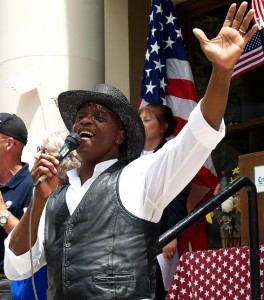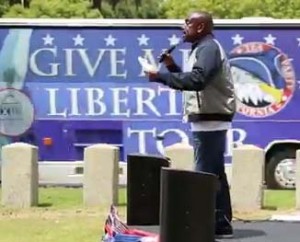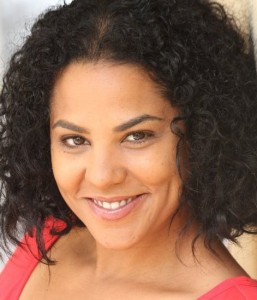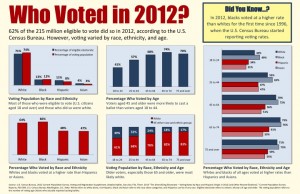African American Members of the Tea Party Reflect on the Politics of Race
Lloyd Marcus walked offstage after performing at a tea party rally in Travis City, Michigan. A fan favorite, Marcus has entertained crowds of tea party faithful with his political speeches and musical performances since 2009. Waiting backstage was one of his many admirers, an older white woman in a wheelchair.
“And she said, ‘Oh, my gosh! It’s Lloyd Marcus!’” Marcus recounted. “Can I have a picture and an autograph?”
Marcus later learned the woman was terminally ill. The only thing she wanted to do before she died was to meet her hero.
“I get choked up when I talk about it,” Marcus said, fighting back tears. “Does that sound like a redneck who hates a black person?”
Marcus, a writer, singer, songwriter and activist, is a prominent voice in the tea party movement. He is the chairman of the Conservative Campaign Committee. He is also African American.
Clearly, whites comprise the majority of tea party members, but there are African Americans and other racial minorities who also participate in and support the movement. Media pundits, researchers and political opponents emphasize the low rate of minority support – using that statistic as proof of de facto racism. However, black tea party members emphasize their agreement with the movement’s core issues, arguing that race is irrelevant.
“I am with those people because we want the same thing. We want smaller government, freedom and liberty,” Marcus said. “I have been to well over 400 tea parties nationwide, and they have nothing to do with race.”
A racist movement?
Political opponents have accused the tea party of being a fundamentally racist movement since its inception, frequently using inflammatory rhetoric to make their point.
Florida Rep. Alan Grayson, a Democrat, suggested in a fundraising email that the “t” in tea party stood for the burning cross of the Ku Klux Klan. Indiana Rep. Andre Carson, also a Democrat and a member of the Congressional Black Caucus, said tea partyers on Capitol Hill would like to see blacks “hanging on a tree.”
Democrat New York Rep. Charles Rangel has referred to tea party members as “white crackers,” the same types of people who decades ago opposed civil rights. Recently, he called tea party Republicans “mean, racist people” from former “slave-holding states” who fly the Confederate flag.
In contrast to much of the political hyperbole, researchers who have studied the tea party do not believe the movement is inherently racist, nor do they believe that most tea partyers are racists. However, they do argue the movement includes “elements” – individuals or groups – that have exhibited explicitly racist views.
“Like other social movement, the tea party drew up a variety of people and concerns in its wake,” said David Meyer, Professor of Sociology at the University of California, Irvine, in an email communication.
Meyer edited Understanding the Tea Party Movement, a book analyzing the tea party as a social movement, that is, a group of individuals and organizations working together to enact or resist social or political change.
Examples of these racist elements include the remnants of the Minuteman Project, historic links to the John Birch Society and a number of “outright racists” – as demonstrated by the inflammatory placards displayed at rallies and bigoted comments made by tea party sympathizers on local websites and captured on YouTube videos, Meyer said.
By taking a broad view, said Meyer, researchers are able to see racist elements in the tea party that may not be visible to people active in the movement in many locations.
But how central are these elements to the tea party movement?
“You have to make a judgment,” Meyer said.
Jesse Klein, a doctoral candidate in Sociology at Florida State University, interviewed dozens of tea party activists and attended numerous rallies in Tallahassee, Florida between 2009 and 2011. Most of the participants at the rallies were white, but she did not witness any racist behavior.
“From the conversations I had on the ground and from being at rallies,” Klein said, “I never experienced something where they were overtly racist in any way to anybody. In fact, every single rally, they tried to have a least one speaker that was African American or Latino.”
African American tea party members emphatically disagree the movement is racist. This includes supporters who have participated in both local and national events across the country from the earliest days of the movement.
Marcus has attended hundreds of tea party rallies across the country and has not seen or experienced any racist behavior.
“There are no, I repeat, no, zero, nada racist signs or racist acting people at tea party rallies,” Marcus said.
The Rev. Jesse Lee Peterson hasn’t experienced any racism at tea party events, either.
Peterson, who is African America, is the founder and president of the Brotherhood Organization of a New Destiny, or BOND, a nonprofit dedicated to supporting black men and their families.
He is also the founder of the South Central LA Tea Party, which he established to educate African Americans and Hispanics about the movement and to encourage greater minority participation. Currently, it has about 500 local members, mostly African American and Hispanic.
“I have spoken at tea parties all over the country, and since the beginning, and I have not experienced one ounce of racism,” Peterson said. “I have not felt uncomfortable, I have not felt separate from the rest of the folks, or any of that, not at all.”
Peterson believes that the continued accusations of racism is an attempt by opponents to manipulate public opinion and prevent others from seeing the positive impact the tea party movement is having on the country.
“It’s not about race,” Peterson said. “It’s about American people fighting to maintain and get back some of our freedom that big government has taken from us.”
The debate over racial diversity
While the movement is not about race, as argued by black tea party members, it does appear to be predominantly white. Researchers who have studied and written about the tea party have argued there is little racial diversity among the movement’s supporters.
“I saw almost no racial diversity,” said Vanessa Williamson, a doctoral candidate at Harvard University’s Department of Government and Social Policy. “Almost every person I spoke to or met or saw at a meeting was white.”
Williamson is co-author of The Tea Party and the Remaking of Republican Conservatism, one of the earliest academic publications on the movement. The book focused on tea party activities from 2009 through 2011.
Williamson also said that most of the tea party supporters she interviewed were older. As there is less racial diversity in older age groups, it was not surprising to find the majority of tea party activists were white, said Williamson. Other researchers have also found similarly low levels of minority representation in their studies.
However, Kira Davis objects to the characterization of the tea party as old and white.
“I know that’s not true,” Davis said.
Davis, 39, a self-described “blogger and stay-at-home mom,” writes for the conservative Independent Journal Review and hosts her own internet radio show, The Dark Side with Kira Davis. She is also African-American.
“I call myself a tea partyer because I long for more freedom from my government,” Davis said.
Davis attended her first tea party rally in 2010. She had heard they were “filled with a lot of racists” but, spurred by a heavy tax bill that emptied her savings and drawn by their “taxed enough already” slogan, she decided to check it out for herself. And she was struck by the diversity of the crowd.
“It was the opposite of what I expected,” Davis said.
There were “all kinds of people” in the crowd: old, young, black, white, Hispanics and Asians. Since her first rally, Davis has attended numerous tea party events and disagrees with the stereotype that tea party supporters are only white.
“I just think that is a narrative that is more convenient for people to believe, but from personal experience, I know it’s not true,” Davis said.
Like other African-American tea party members, Davis is uncomfortable with what she sees as the overemphasis on race. As white is the single largest race in the country, Davis said, it is natural that wherever you go you will find more white people in group activities.
“I think we just need to be realistic about the demographics of our country,” Davis said.
But to Davis, it’s not the racial composition of the movement that matters, but what it stands for: less intrusive government, lower taxes, and more economic and regulatory freedom for Americans.
“It doesn’t matter if the tea party is all old white people or all young black people,” Davis said. “It wouldn’t matter, because it’s not about the race of the people, it’s about what the movement is about.”
A small but growing part of the movement
Researchers studying the tea party movement admit to interviewing few or no minority members for their studies. This is due only in part to the predominance of white members. It is also a function of the general belief held by researchers that minorities are a very small – and therefore largely irrelevant – part of the movement.
Peterson agrees there needs to be more black and Hispanic involvement in the tea party movement, but he disagrees with this general view of minority participation.
“It’s more than what liberal professors and the media would like to think,” Peterson said.
Kenneth McClenton agrees.
“We are not as minute in number as most people would think,” he said.
McClenton is the host of The Exceptional Conservative, an internet radio show sponsored by ACNation, a conservative media network. A staunch supporter of the tea party, he is also African American.
Based in Washington, D.C., McClenton’s radio show attracts an audience from around the country, which gives him a unique view of the growth of the tea party as a grassroots movement. The media often cites various failed congressional campaigns by tea party candidates as examples of why the movement is waning. McClenton, however, places greater emphasis on the increase in the number of local level activists running for office, such as mayor or city council.
“What they are not noting is that these are almost twice the number that ran last time,” McClenton said. “By 2016 you will probably see a four-fold growth in the number of tea party persons around the country who are running for spots of authority.”
“We are growing in number, and we are growing in terms of influence,” he said.
McClenton has also seen an increase in the number of minority supporters of the tea party movement. McClenton is an administrator of the Hispanic and Black American Tea Party Facebook page. Currently, the page has about 2,400 members and, according to McClenton, membership has grown rapidly over the last 18 months.
“Many of us are turning to social media to express more openly our thoughts and opinions on economic and governmental policies,” McClenton said. “One of the great things about the site is that like-minded people go back to their own sites and they talk about what they learn from that site and others join.”
“It’s just a wonderful opportunity,” said McClenton.
Seeing racism
Minority support for the tea party is increasing, according to black tea party members. But if the tea party has racist elements, as academic researchers suggest, why would any African Americans support the movement?
Nella Van Dyke, Professor of Sociology at the University of California, Merced, wonders if the racism in the tea party is just ignored by minority members. Van Dyke has worked with David Meyer on research about the movement.
“They don’t promote the racism in a really blatant, overt way,” Van Dyke said, “and I guess that minorities are used to dealing with racists everywhere they go, so why should the tea party be any different?”
“I am not surprised black tea partiers don’t see racism,” said Meyer.
Jessica Shorter started as a tea party activist in 2009. A data entry technician living in Hobbs, NM, she is of black, white and Native American ancestry. When asked what drew her to the movement, she was unequivocal.
“I thought that I was getting into something revolutionary,” Shorter said.
A die-hard constitutionalist, the tea party movement gave her activism a spark, and she started attending rallies and meetings. She even sent tea bags to Washington.
“I was a little dramatic about it,” Shorter said.
While she doesn’t attend as many local tea party meetings as she used to, she still goes occasionally to hear and discuss the latest topics.
“I still stay connected because you never know when something big is going to happen,” Shorter said. “You never know when you are going to be needed.”
But is the tea party racist?
“No, what I’ve seen, no, it’s not,” Shorter said. “I’m not extremely touchy about that stuff, either, but I do pay attention to it.”
“I definitely know what racism is.” Shorter said, “I haven’t seen any.”
Elizabeth M. Grieco
American University
May 3, 2014
DATA DILEMMA
What makes the tea party so hard to survey? Read more.
Lloyd Marcus entertains the crowd at a tea party rally. (Photo provided by Lloyd Marcus.)
“I cannot tell you how many times people say to me, well, you’re a black guy. Why are you a member of the tea party? I feel like saying, as a person who loves this country, why are you not a member of the tea party? Because the race thing is so irrelevant.”
Lloyd Marcus, chairman of the Conservative Campaign Committee
The Rev. Jesse Lee Peterson speaks at the April 2014 “Give Us Liberty” bus tour and rally in Los Angeles. (Photo provided by BOND.)
“It’s not about race, it’s not about what party you are in, it’s about American people fighting to maintain and get back some of our freedom that big government has taken from us.”
The Rev. Jesse Lee Peterson, founder and president of BOND.
Kira Davis. (Photo provided by Kira Davis.)
“It doesn’t matter if the tea party is all old white people or all young black people. It wouldn’t matter, because it’s not about the race of the people, it’s about what the movement is about.”
Kira Davis, staff writer for the Independent Journal Review
INFOGRAPHIC
Who voted in 2012 by race, ethnicity and age.
ABOUT THIS ARTICLE
The author muses on Black Tea and future stories. Read more.



